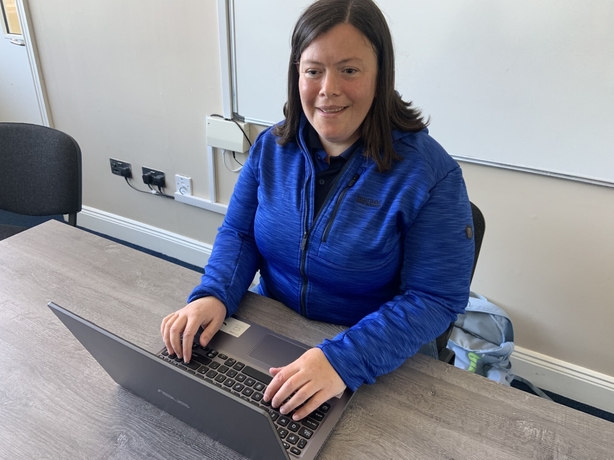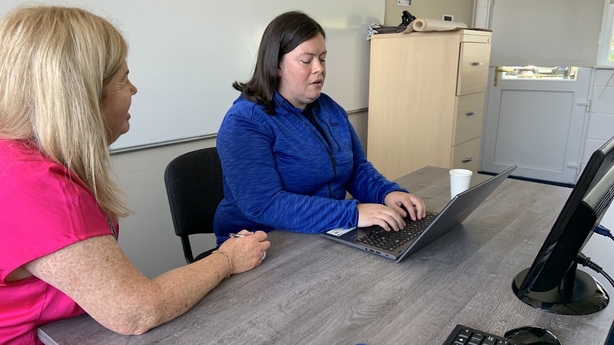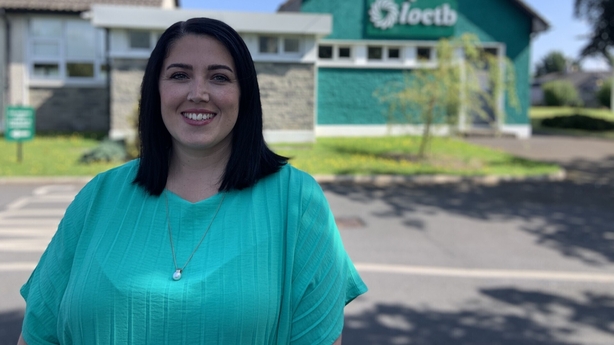A paralympian from Laois is supporting a campaign calling for increased financial supports for adult learners.
Ailish Dunne who is blind and competed in the London Paralympics in 2012, has high hopes of going to university to study psychology.
But she fears it may just be a pipe dream unless she receives proper financial support.
"I've been through so much in the last few years and have achieved so much that now for the next step I don't want the cost of education to hold me back from achieving my dreams."

New research shows people are being forced to choose between paying their household bills or staying in further education.
A total of 41% of people participating in adult education are struggling to pay for heating and meals.
While almost one third of people surveyed said they need greater financial support to remain in education to improve their quality of life, build knowledge, and boost their career opportunities.
The findings have been published by the national adult learning organisation AONTAS, as part of their 'Holding You Back Campaign'.
Ms Dunne was born with sight, but at the age of 18 she contracted the very rare disease, cerebral vasculitis, which she said left her fully blind.
She was introduced to Shot Put and Discus and discovered she had a talent in these disciplines which led to her competing at world events as well as the paralympics.
However, she had to retire from competitive sport when she suffered a hand injury after her cane got stuck in a crack in a footpath.
Despite multiple surgeries, Ms Dunne could face another operation and has encountered a further complication due to a congenital disorder that caused the bones in her wrist to fuse together.
Now she has turned her attention to pursing a new dream to study psychology to improve her job opportunities and earning potential.
In preparation she has been attending the Laois Offaly ETB in Mountmellick, where she is learning how to use a computer.
"I decided to do computers first because I also need to learn how to use the software for visually impaired, which is called NVDA. It meant that I'd learn how to use a computer like everybody else."

Ms Dunne recently moved to live independently, locally in Mountmellick, and already has noticed a spike in her outgoings.
She is concerned that if she moves to Dublin for university or must travel daily she would not be able to afford it.
"I'm only on social welfare, and I've recently moved out and live independently, I have a lot more expenses, so I'm absolutely terrified to do it, I don't know how it's going to work out.
"The other barriers are technology keeping up with everybody else, and the stigma of people thinking that we can't do it.
"The percentage of people with disabilities that are in education is ridiculous. It's so low it's disheartening to see that we still haven't developed to the level that we should be.
"The cost of education is holding us back, and even though the ETB have helped out so much, funding is not there for them either so literally it's all about costs."
Ahead of Budget 2025, AONTAS is calling on the Government to increase supplementary allowances for adult leaners to reduce barriers to entering and remaining in further education.
It is seeking a 50% increase in allowances for adult learners, as well as an increase in social welfare payments, and a commitment to provide more information for the public on adult education courses and supports available.
"At the moment, if someone is getting a meal allowance, they only get 80 cent per day. That wouldn't even buy you a cup of tea," AONTAS Chief Executive Director Dearbháil Lawless said.

Allowances for most lifelong learners cover costs such as meals, accommodation and transport.
These are the some of the costs and barriers holding people back that the organisation is hoping to highlight with their campaign, according to Ms Lawless.
"The barriers that people face in accessing education include stigma, stereotyping and things like financial barriers.
"We're focusing on the everyday costs that people just can't afford while they're trying to engage in education."
A major concern for the organisation is people who are living below the poverty line, despite getting some financial support.
"We know there are apprentices who can't afford to stay in accommodation near their training.
"They can't afford to travel home, so they're actually sleeping in their vans while they're studying full time."
As well as seeking allowance increases, AONTAS wants to see better access to information on what is currently available.
Ms Lawless believes if people knew exactly what supports were accessible it could ease financial burdens faced by people who are trying to make ends meet.
"At the moment, a lot of people don't even know where to look. They don't know what supports are available.
"But if we have a space with clear information in plain language that provides everything around the supports available, and a space where they can understand the pathways and the options that they have, that would make a huge difference to thousands of people in Ireland."







